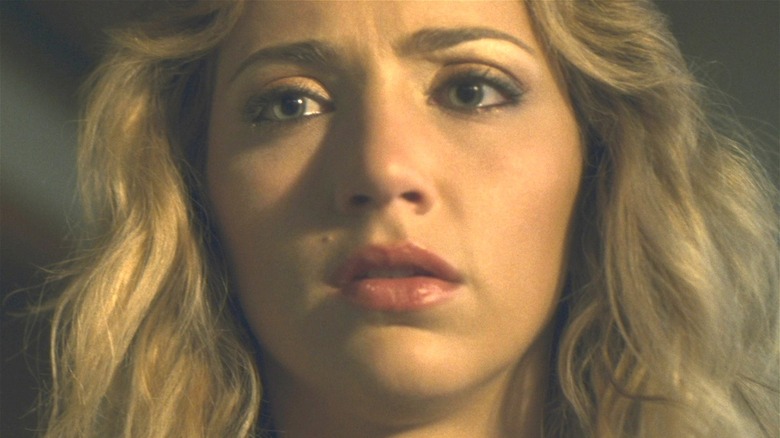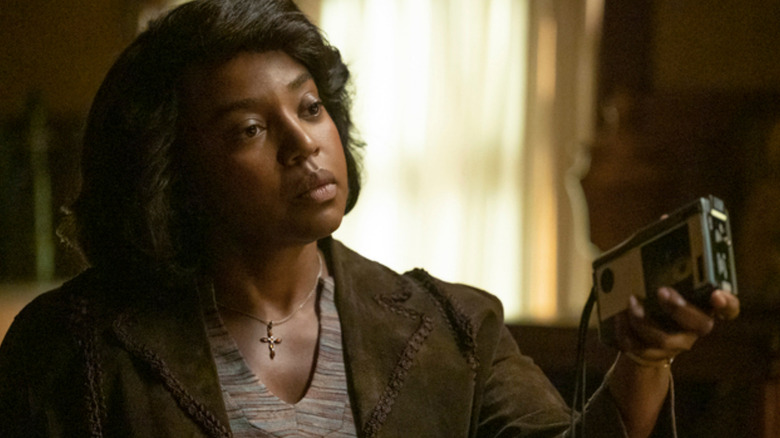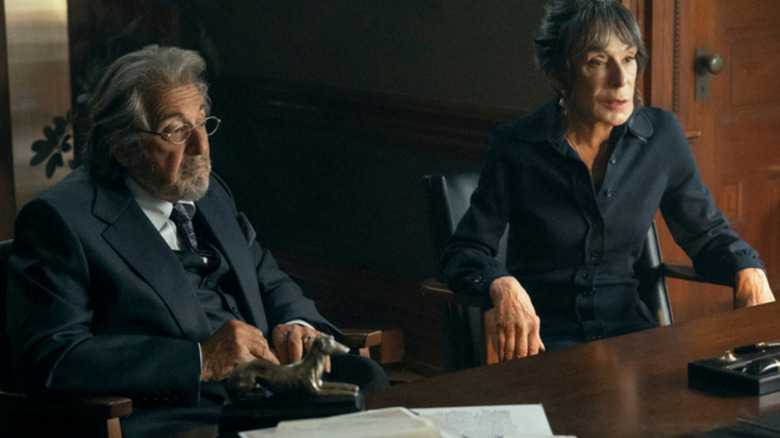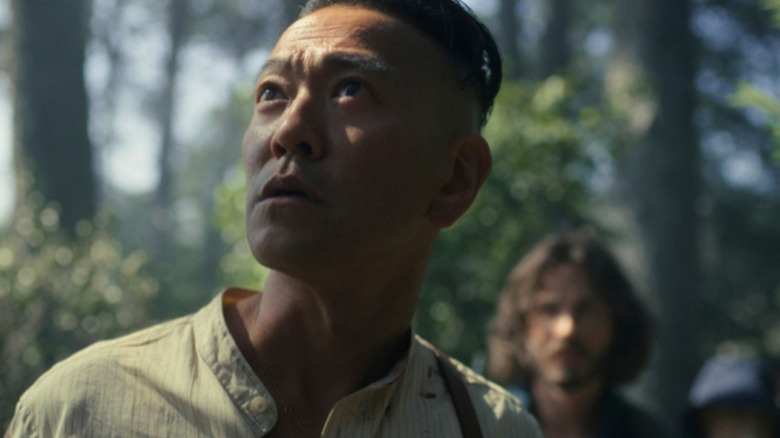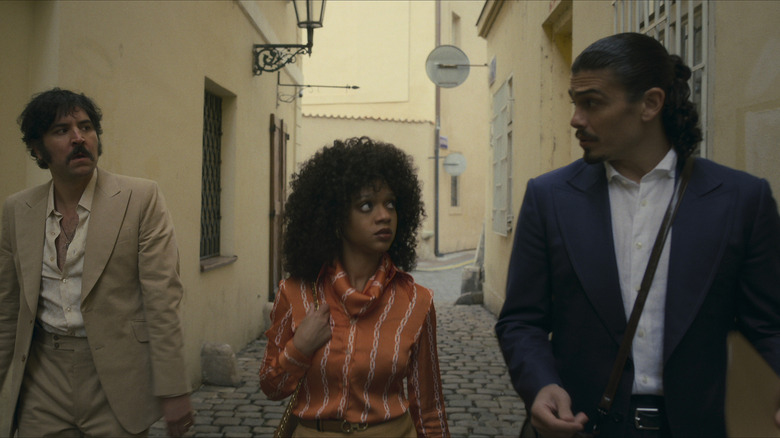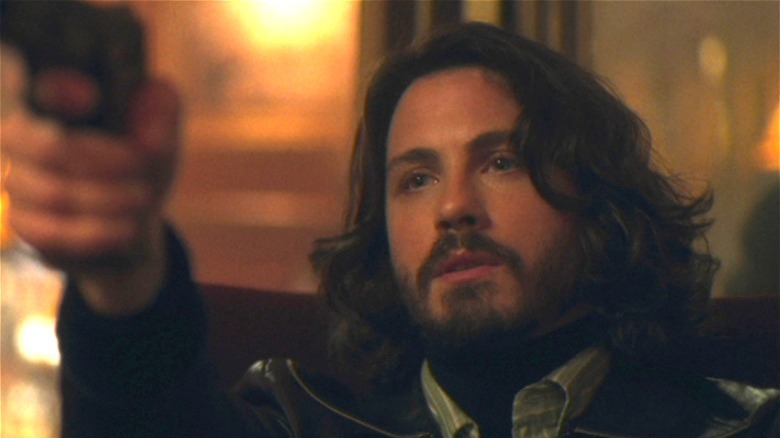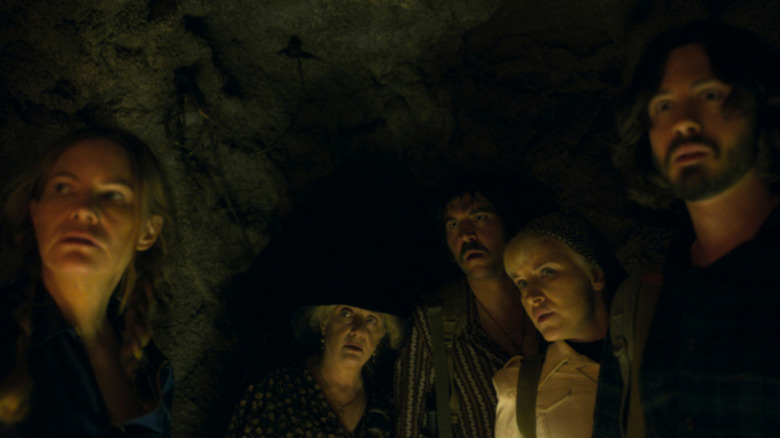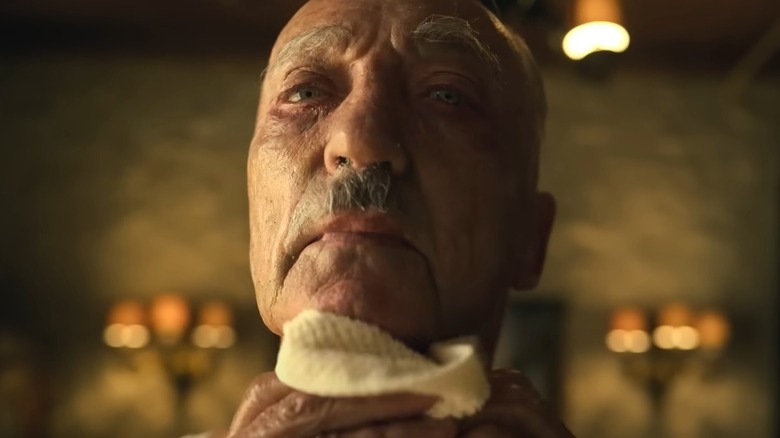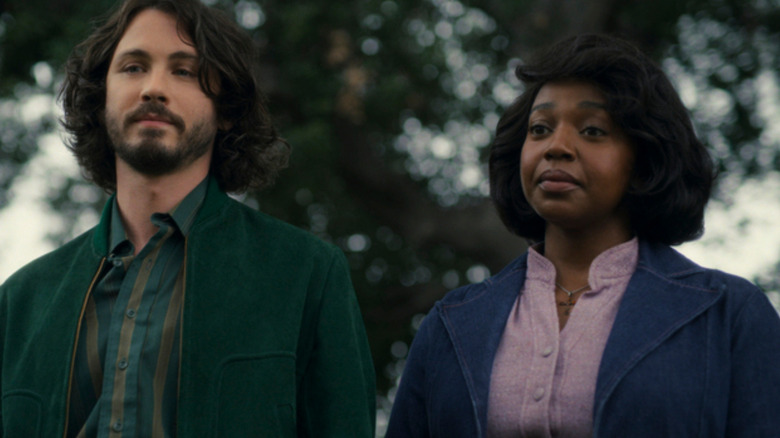The Ending Of Hunters Season 2 Explained
This article contains spoilers for Season 1 and Season 2 of "Hunters."
History is full of tales that continue to astound us for many years after they took place. As fans of Amazon Prime's "Hunters" know, not every story from the past has a satisfying conclusion. For instance, despite the unspeakable atrocities committed by the Nazis before, during, and after World War II, many higher-ups not only survived but thrived after the war. Yet, as mortifying as that is, there is also a lengthy history of justice-seeking Nazi Hunters who traveled to the ends of the earth to track these criminals down and eliminate the threat they posed.
"Hunters" follows a fictional group of Nazi Hunters as they attempt to track down Nazis in hiding while struggling with the morality of their endeavors and the effects of generational trauma in the late 1970s. The first season sees Jonah (Logan Lerman) taking the place of his grandmother among the Hunters after she is killed. There's also the devastating revelation that Meyer Offerman (Al Pacino), a man who poses as a Jewish Holocaust survivor, is in truth a former Nazi. Season 2 goes even bigger by following up on the conspiracy theory that Adolf Hitler survived the war, introducing him and his wife Eva Braun as characters hoping to bring about a Fourth Reich.
The Season 2 finale is a wild ride, to say the least. So buckle up, because we've got some explaining to do.
The trial of Adolf Hitler
After the justice system fails to punish a known Nazi war criminal despite an overwhelming amount of first-hand accounts detailing his brutality, FBI agent Millie Morris (Jerrika Hinton) takes the law into her own hands and kills him in a brief confrontation. This forces her to go into hiding and leads to a crisis of morality — she begins to worry that she's gone too far. However, her actions are forgiven (by the authorities and in her own mind) after she plays an important part in bringing Hitler to trial. When the Nazi leader is tracked down, Jonah opts to hand him over instead of killing him on the spot. Millie is able to play a part in turning Hitler over to the justice system, which leads to him being put on trial for his heinous crimes.
Not only does this give Millie and the others a chance to force the judicial branch to do its duty and condemn this man whose crimes count well into the millions, but it also allows actor Udo Kier (Hitler) to show off his acting chops. Under questioning, Hitler leans into the many lies of fascism, insisting that everyone who takes the stand against him is simply part of a larger conspiracy organized by the Jewish people. He insists that his supporters will always follow him, all but telling the court that he is fully aware of the harm he caused and isn't remotely sorry for it. The trial drives home the idea that fascists cannot be reasoned with and that remorse is beyond them, so ingrained are their hateful beliefs.
The truth about Ruth's death is revealed
Meyer perishes in the Season 1 finale after Jonah works out that he's a fraud, but the character returns for a series of flashbacks in Season 2, filling in some of the blanks. While the first season explores the horrors Ruth and her lover — the real Meyer — suffered during their time in the concentration camp, this round of episodes shows the true malice of a faker who seems to exist outside of the rest of the cast due to his conniving nature, detached sadism, and increasingly desperate brutality. Though these flashbacks aren't totally necessary to Season 2's overarching story, they speak to the themes of the show. One genuinely crucial detail that is dropped in the flashbacks is what really happened to Jonah's grandmother Ruth.
Though we see in the first season that Ruth meets a violent end at the hands of the Nazi Richter, here we discover that her death was actually orchestrated by the man posing as Meyer. After a particularly brutal scene in which Ruth begs a justice to take action against known Nazis in hiding, Meyer speaks to the man in private, dismissing her as "an old woman" and telling him to let it go. When Ruth discovers the truth about who he is, he calmly informs Richter of the threat she poses to him and sits back as he kills her. This shows that, despite the fake Meyer (whose real name is Wilhelm Zuchs) becoming a Hunter to atone for his sins, he's still just a selfish Nazi who will take life in order to preserve his own.
The many power grabs
Known as The Colonel through much of the first season, we eventually learn that the Neo-Nazi behind so many of our ragtag crew's problems is actually none other than the notorious real-world figure Eva Braun, who became Eva Hitler very shortly before she and the Nazi leader died by suicide in 1945. With Soviet forces closing in on their Berlin bunker, they took matters into their own hands, knowing the end was near. As "Hunters" fans know, the first season finale supposes that they actually fled and survived, with Braun (played by Lena Olin) then taking on active leadership and attempting to bring about the Fourth Reich by carrying on criminal misdeeds and recruiting Neo-Nazis like the deranged Travis (Greg Austin). We discover that Hitler has been in hiding and generally living what should be a peaceful life on a beautiful remote estate in South America, but he is haunted by his dreams of returning to power.
It's plain to see that all is not well with the Nazi power couple. While Hitler is an egotist obsessing about his own importance to a new generation, Eva has all but usurped him in the chain of command, insisting that he's become completely useless and that she will be a more fitting leader going forward. This places her in a chilling position of authority over people like Travis, but she underestimates his level of devotion to her and is shocked as he kills her in hopes of taking her place at the top of the Nazi chain of command. This leads to Travis nearly being killed by Jonah, only to apparently escape, creating one of the few open-ended mysteries of the Season 2 finale.
The stories we tell
One of the strongest themes of "Hunters" is the way that storytelling and the sharing of memories, even painful ones, are a major part of how people survive. This manifests endlessly through both seasons, with flashbacks to Ruth's time in the concentration camp telling us all we need to know about what drove her to a life of passionately fighting for a world in which these monsters could not escape their crimes. Likewise, when Carol Kane's Mindy Markowitz takes the stand against Hitler, she shares details of being a hopeful young woman who loved to dance to the radio before the Nazis came, claiming, "We were just people." Haunted by what occurred, she is also equally pained by thoughts of what might have been had her world not been torn apart by the Nazis.
The penultimate episode of Season 2 takes a surprise tangent into the far past. While Jonah is kicking Hitler along a path at the end of his pistol, we are suddenly transported into the home of the chief architect of the Nazis. This man and his wife are secretly hiding many Jewish people while pledging loyalty to Hitler's regime, but when the Nazis come to inspect them, the couple is ultimately killed and a higher-up takes over their house. After an explosive series of deaths, a young boy runs into the woods with his siblings, noting, "I think we are ghosts. This is a ghost story." In the present, we see that he has become the man who will transport Hitler, but his appearance in the series is very much that of an apparition. The way these horrors become legend is all over "Hunters," and moments like this drive that theme home.
What makes a monster?
Each character in "Hunters" grapples with the heavy emotional consequences of their actions in some way or another. Jonah is stricken with remorse for the events of the first season and is attempting to live a normal life. Still, he finds himself unable to give up his Hunter ways, leading a sort of double life that ultimately all comes crashing down around him. His story isn't necessarily unique among the Hunters, as they all struggle with the violence that comes from their vocation throughout the series. After she murders the fraudulent Bishop, Millie is likewise haunted by the ethics of her choices, unable to cope with her decision to end a man's life despite his crimes against humanity.
While these central characters are plagued by the morality of hunting and murdering people despite the things they have done, true monsters like The Colonel, the man posing as Meyer, and Adolf Hitler suffer no such doubts. In this way, putting Hitler on trial shows the Hunters forcing the world to legitimize their inability to let these things go, and it sees Millie return to the United States, officially forgiven for the killing of the Bishop. Things aren't that simple for Jonah — his fiancée is mortified when she sees who he really is, leading to a temporary separation. In the Season 2 finale, we see that she has apparently gotten over it, as the two are married. The show asks a lot of questions but doesn't necessarily resolve them all, but the narrative still makes space for these characters to forgive themselves for the things they've done.
Survivor's guilt
In the second season, we meet Chava (Jennifer Jason Leigh), Ruth's younger sister who was long believed to have perished in the war. Though Chava loves her sister dearly, she refuses to contact her, noting that it would only pain her to see the woman she has become. Likewise, she leaves the love of her life when she realizes he wants her to give up the fight and settle down. Though she is violent in the extreme throughout, we see a woman who has been absolutely shattered by the things she saw and lived through. For her, there is no life outside of her quest for revenge, and she denies each opportunity to make one in favor of continuing her mission.
Not all of the characters in this series are survivors of the Holocaust, but those that are bear the burden of lived experience as they attempt to navigate a world that tells them that it has moved on. While the Hunters are all spurred on by the sheer injustice of the surviving Nazis going on to live happy lives, characters like Chava, Ruth, Murray, Zev, and Mindy bear the scars — visible or otherwise — of the inhumane concentration camps. This manifests differently for each of them, but Mindy's painful recollection of her child's death, her tearful observance that she can't be old because she and Murray were supposed to grow old together, and her painful testimony in the finale all drive home the sheer loss and survivor's guilt these characters feel.
Don't you know who I am?
The question of duplicity both during and after World War II manifests in many forms in "Hunters." The most glaring example of this is the man posing as Meyer. He had a hand in torturing Ruth, the woman he later befriends while posing as her long lost love, who he actually killed. This is monstrous, but history is full of horror stories, as "Hunters" drives home. Though Meyer is not based on a specific historical figure, the endless betrayals the Jewish people went through during the existence of the Nazi regime are beyond ghastly, with many people forced to realize that friends, neighbors, and family members that they thought they could trust were the ones that sold them out.
Meyer's story is mirrored by that of Hitler, who, after his trial, is sentenced to life in prison, where he is completely forgotten. This may seem like an offbeat choice to anyone that was expecting a satisfyingly gory conclusion for the wicked man who ruined and ended so many lives, but for a person so ravenous for attention and validation of his ideology, what more fitting punishment is there than to be forgotten? While many of those in his command were put on trial and executed during the Nuremberg Trials, Hitler himself died comparatively peacefully by suicide. Bringing him back and giving him a suitably pathetic ending as he cries "Don't you know who I am?" forces him to endure something that, for a man like Hitler, is a fate worse than death.
Never the end
There aren't many loose plot threads left unresolved by the Season 2 finale, and most of the main characters seem content or even happy by the time the credits roll. Millie and Harriet have fallen in love and Millie has apparently returned to her life as an FBI agent. Roxy and Lonny have made amends, Joe is off having adventures, and Jonah is married to his fiancée after a highly tumultuous season nearly saw their bond broken forever. It seems like everything has worked out for the crew in the end, freeing them up to lead new lives away from the influence of the many traumas they each experienced throughout the series. But are they really ready to give up hunting Nazis?
Jonah's wedding sees him vow to give up his old life, but then Harriet appears and pitches Jonah on the idea of getting back out there to kill some more Nazis for old time's sake. The conclusion of the series is open-ended in this way, with Jonah gazing off into the distance at a man who we presume to be a former Nazi before the screen fades to black. We can't say for sure, but we'd wager that this man isn't going to survive the night. Jonah's wife, Clara, is likely to join the Hunters this time rather than sit on the sidelines. It looks like hunting is set to become the family business.
